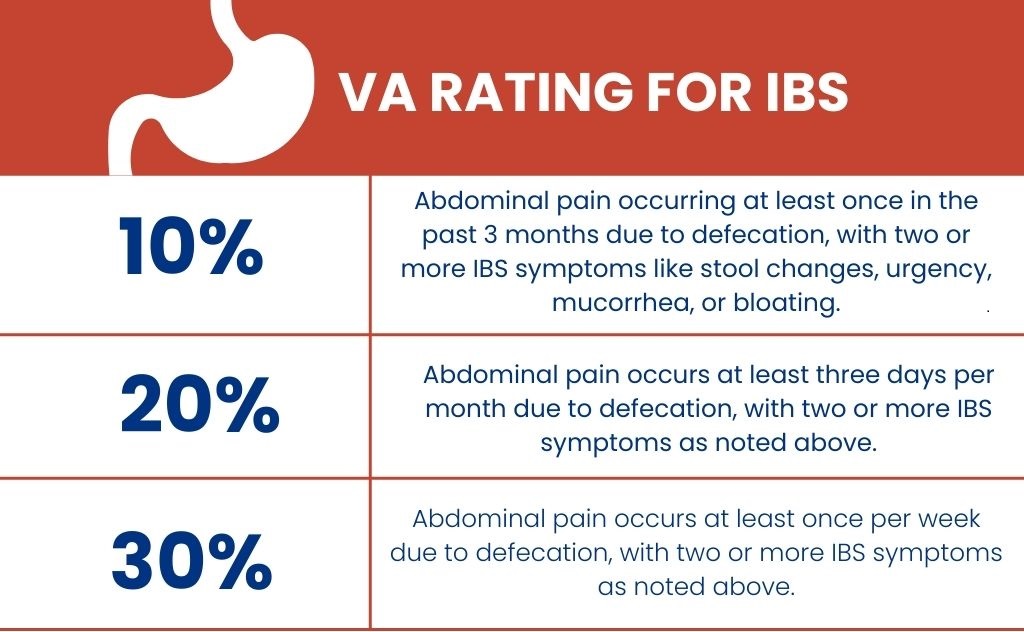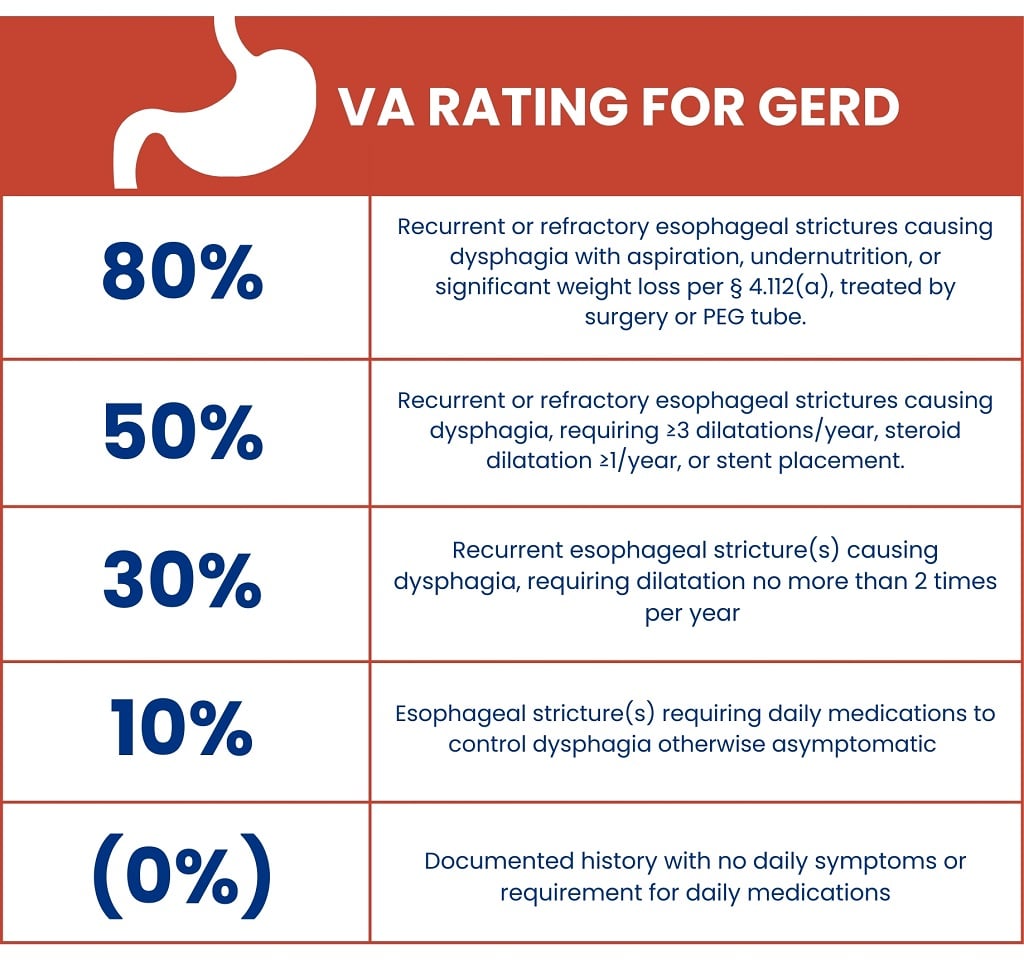Irritable Bowel Syndrome (IBS) and Gastroesophageal Reflux Disease (GERD) are two common gastrointestinal conditions that can significantly impact the daily lives of veterans. When these conditions coexist, they can exacerbate each other, leading to more severe symptoms and complications. Veterans suffering from both IBS and GERD may be eligible for VA disability compensation.
VA Disability Ratings for IBS with GERD
The VA rates IBS and GERD under different diagnostic codes, but when these conditions coexist, the overall rating is determined by the combined impact on the veteran’s health and daily functioning.

Update (2024): The VA has updated its rating criteria for IBS. Under the new criteria, Veterans may now be entitled to 10, 20, or 30 percent evaluations based on the frequency and severity of symptoms, ensuring that there is always a compensable evaluation.

Get Help With Your VA Disability Claim
GERD Secondary to IBS
Veterans may develop GERD as a secondary condition to IBS due to the stress and physical strain that IBS places on the digestive system. In such cases, GERD can be service-connected as secondary to IBS, which may lead to an increased overall disability rating. Learn more about Irritable Bowel Syndrome here.
IBS Secondary to GERD
Conversely, IBS can develop or worsen due to GERD, especially if GERD symptoms cause anxiety or dietary changes that affect the digestive system. Veterans can claim IBS as secondary to GERD, allowing for a combined rating that more accurately reflects the overall impact of both conditions. Learn more about GERD VA ratings here.
Establishing IBS as Secondary to GERD: Case Study
In this case, a veteran who served from January 1994 until February 1999 sought an increased disability rating for his service-connected Gastroesophageal Reflux Disease (GERD). Over time, the veteran developed additional gastrointestinal issues, including Irritable Bowel Syndrome (IBS), hiatal hernia, H-pylori, and diverticulitis. The veteran argued that his IBS should be considered secondary to his service-connected GERD, which aggravated and contributed to the severity of his overall gastrointestinal condition.
The Board of Veterans’ Appeals (Board) recognized the interrelated nature of the veteran’s gastrointestinal conditions and determined that his IBS was indeed secondary to his GERD. The Board concluded that the veteran’s combined gastrointestinal conditions, including IBS secondary to GERD, warranted a 60% disability rating due to the severe impairment of health they caused.
Key Factors That Contributed to Winning the Claim:
- Connection Between GERD and IBS: The veteran provided evidence that his IBS developed as a result of his service-connected GERD. The symptoms of GERD, such as acid reflux and digestive issues, were shown to exacerbate the veteran’s IBS, leading to more frequent and severe episodes of abdominal pain, diarrhea, and constipation.
- Comprehensive Symptom Documentation: The veteran experienced severe abdominal pain, daily nausea, alternating constipation and diarrhea. The Board acknowledged that these symptoms, particularly the IBS, were aggravated by the underlying GERD, contributing to the veteran’s overall health decline.
- Medical Evidence Supporting the Secondary Connection: Medical records and VA examinations demonstrated that the veteran’s IBS was likely a secondary condition resulting from his GERD. This connection between the two conditions was crucial in establishing that the severity of the veteran’s gastrointestinal issues was due to the combined effects of both conditions.
- Application of VA Regulations: The Board applied the appropriate VA regulations under 38 C.F.R. § 4.114, Diagnostic Code 7346, which allows for a higher rating when multiple gastrointestinal conditions contribute to severe health impairment. The veteran’s GERD and IBS, when considered together, justified elevating his disability rating to 60%.
By establishing that his IBS was secondary to his service-connected GERD, the veteran secured a higher disability rating. Did you know that there are a variety of other secondary conditions that connect with IBS? Learn more in our IBS Secondary Conditions guide here.
Filing a VA Claim for IBS with GERD
If you believe your IBS and GERD are connected to your military service or if one condition is secondary to the other, follow these steps to file a claim:
- Gather Evidence: Collect all relevant medical records, including documentation of your symptoms and any medical nexus statements.
- Complete VA Form 21-526EZ: Use this form to apply for disability compensation.
- Submit Your Claim: Submit your claim online through the VA’s eBenefits portal, by mail, or in person at a VA regional office.
- Seek Assistance: Consider working with a Veterans Service Officer (VSO) or legal representative to help navigate the claims process.
Proving Your VA Claim for IBS with GERD
Veterans seeking compensation must ensure that their medical records thoroughly document the severity and frequency of symptoms and the impact on their daily life. Here are some tips to strengthen your claim:
- Medical Nexus: Provide a clear medical opinion linking IBS and GERD, especially if claiming one condition as secondary to the other.
- Detailed Symptom Records: Keep detailed records of your symptoms, including frequency, severity, and impact on your daily life.
- Appeal if Necessary: If your initial rating does not accurately reflect the severity of your conditions, consider appealing the decision with additional medical evidence.




